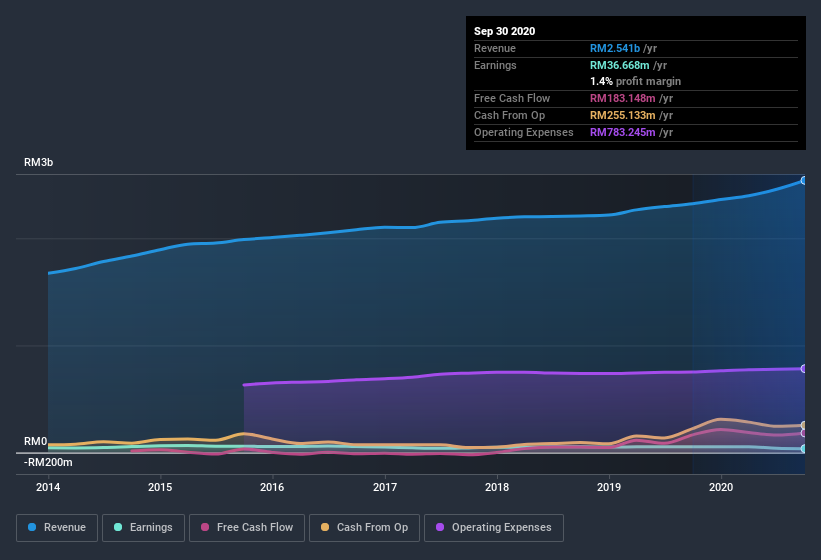- Malaysia
- /
- Food and Staples Retail
- /
- KLSE:SEM
Here's Why 7-Eleven Malaysia Holdings Berhad's (KLSE:SEM) Statutory Earnings Are Arguably Too Conservative

It might be old fashioned, but we really like to invest in companies that make a profit, each and every year. That said, the current statutory profit is not always a good guide to a company's underlying profitability. Today we'll focus on whether this year's statutory profits are a good guide to understanding 7-Eleven Malaysia Holdings Berhad (KLSE:SEM).
It's good to see that over the last twelve months 7-Eleven Malaysia Holdings Berhad made a profit of RM36.7m on revenue of RM2.54b. While it managed to grow its revenue over the last three years, its profit has moved in the other direction, as you can see in the chart below.
Check out our latest analysis for 7-Eleven Malaysia Holdings Berhad

Of course, when it comes to statutory profit, the devil is often in the detail, and we can get a better sense for a company by diving deeper into the financial statements. Today, we'll discuss 7-Eleven Malaysia Holdings Berhad's free cashflow relative to its earnings, and consider what that tells us about the company. That might leave you wondering what analysts are forecasting in terms of future profitability. Luckily, you can click here to see an interactive graph depicting future profitability, based on their estimates.
Examining Cashflow Against 7-Eleven Malaysia Holdings Berhad's Earnings
In high finance, the key ratio used to measure how well a company converts reported profits into free cash flow (FCF) is the accrual ratio (from cashflow). In plain english, this ratio subtracts FCF from net profit, and divides that number by the company's average operating assets over that period. This ratio tells us how much of a company's profit is not backed by free cashflow.
That means a negative accrual ratio is a good thing, because it shows that the company is bringing in more free cash flow than its profit would suggest. That is not intended to imply we should worry about a positive accrual ratio, but it's worth noting where the accrual ratio is rather high. Notably, there is some academic evidence that suggests that a high accrual ratio is a bad sign for near-term profits, generally speaking.
7-Eleven Malaysia Holdings Berhad has an accrual ratio of -0.48 for the year to September 2020. That indicates that its free cash flow quite significantly exceeded its statutory profit. Indeed, in the last twelve months it reported free cash flow of RM183m, well over the RM36.7m it reported in profit. 7-Eleven Malaysia Holdings Berhad shareholders are no doubt pleased that free cash flow improved over the last twelve months.
Our Take On 7-Eleven Malaysia Holdings Berhad's Profit Performance
As we discussed above, 7-Eleven Malaysia Holdings Berhad's accrual ratio indicates strong conversion of profit to free cash flow, which is a positive for the company. Based on this observation, we consider it possible that 7-Eleven Malaysia Holdings Berhad's statutory profit actually understates its earnings potential! Unfortunately, though, its earnings per share actually fell back over the last year. Of course, we've only just scratched the surface when it comes to analysing its earnings; one could also consider margins, forecast growth, and return on investment, among other factors. In light of this, if you'd like to do more analysis on the company, it's vital to be informed of the risks involved. To help with this, we've discovered 3 warning signs (1 can't be ignored!) that you ought to be aware of before buying any shares in 7-Eleven Malaysia Holdings Berhad.
Today we've zoomed in on a single data point to better understand the nature of 7-Eleven Malaysia Holdings Berhad's profit. But there are plenty of other ways to inform your opinion of a company. Some people consider a high return on equity to be a good sign of a quality business. While it might take a little research on your behalf, you may find this free collection of companies boasting high return on equity, or this list of stocks that insiders are buying to be useful.
If you decide to trade 7-Eleven Malaysia Holdings Berhad, use the lowest-cost* platform that is rated #1 Overall by Barron’s, Interactive Brokers. Trade stocks, options, futures, forex, bonds and funds on 135 markets, all from a single integrated account. Promoted
New: AI Stock Screener & Alerts
Our new AI Stock Screener scans the market every day to uncover opportunities.
• Dividend Powerhouses (3%+ Yield)
• Undervalued Small Caps with Insider Buying
• High growth Tech and AI Companies
Or build your own from over 50 metrics.
This article by Simply Wall St is general in nature. It does not constitute a recommendation to buy or sell any stock, and does not take account of your objectives, or your financial situation. We aim to bring you long-term focused analysis driven by fundamental data. Note that our analysis may not factor in the latest price-sensitive company announcements or qualitative material. Simply Wall St has no position in any stocks mentioned.
*Interactive Brokers Rated Lowest Cost Broker by StockBrokers.com Annual Online Review 2020
Have feedback on this article? Concerned about the content? Get in touch with us directly. Alternatively, email editorial-team (at) simplywallst.com.
About KLSE:SEM
7-Eleven Malaysia Holdings Berhad
An investment holding company, owns, operates, and franchises a chain of convenience stores under the 7-Eleven brand in Malaysia.
High growth potential and slightly overvalued.
Market Insights
Community Narratives



